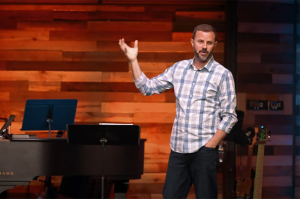Can Christian Ministries Actually Be Optimized?
An Interview with Medical Ministry International CEO, Sam Smith
An established executive in branding and marketing in the retail world, Sam Smith realized the need for compassionate, yet professional business acumen within ministry leadership and coined the term "Optimizing Ministry."
Sam used that focus to achieve record results in fundraising and volunteer support as the CEO at Mercy Ships. He was then approached by Medical Ministry International (www.mmint.org) and is now able to make an even larger impact on the poor as CEO of that global organization. MMI has staff and programs in more than 22 countries that utilize health centers, residency training, and medical teams to serve the poor using Jesus as their guide. Sam is the author of the book, "When Love Heals" and blogs at sam-smith.net. Recently, I interviewed Sam about his insights on leadership and international ministry:
Phil Cooke: You're a nonprofit leader with a long background in business. Has that been a help or hindrance?
Sam Smith: It's definitely been a help, and I believe it is the reason I have been called into ministry. There are a lot of really good non-profits operating out there that have good, if not great, intentions. Unfortunately, many of them were started by a charismatic person who through sheer will and determination were able to achieve good results, but lack the business acumen to optimize all the gifts they have been provided. I am not a doctor, but I have the ability to provide the processes, accountability, and execution to ensure that those with medical skills can do what they have been gifted to do.
Phil: What can a business mindset bring to ministry?
Sam: You can have passion for what you do, but you also have to optimize every single gift that God has provided. Many people in ministry get caught up in the passion to serve, but are willing to sacrifice accountability and process because they don't want to hurt anyone's feelings. The sad part is that the opposite is actually true. If you don't have the courage to tell people they aren't helping the ministry, but actually holding it back, you aren't helping either one. One of the hardest aspects of my job is to tell people that its time for them to go volunteer somewhere else. The amazing thing is that over time, nearly every one of them will come back and thank me for telling them what others did not have the courage to do.
Phil: Most of your ministry experience has been with medical relief. What is it about that kind of work that attracts you?
Sam: I am a branding and marketing guy and have zero medical skills. What I do have is the experience and ability to run multi-billion dollar organizations and ensure that those with the ability to make miracles happen have a solid foundation to work. You may be surprised to know that half of the roles at Medical Ministry International are non-medical. We have teachers, farmers, plumbers, carpenters, engineers, and more that join forces with our medical teams to do amazing things. I know that if our team works really hard today, somewhere around the world our team is giving someone the chance to live. It just doesn't get better than that for me!
Phil: Medical Ministry International (MMI) has experienced significant growth in a short time under your leadership. What new ideas and leadership techniques have you brought to the table?
Sam: Medical Ministry International started out as primarily a relief organization, but we have refocused the ministry to more of a development mindset. This means that every one of our Health Centers, Project Teams, or Training Programs are developed for the long term benefit of the communities we serve. We have staff on the ground working 365 days a year to provide assessment of need, execution of services, and follow-up and analysis of the work we have done.
Another interesting aspect is that we charge the poor for our services. Now don't get me wrong, we charge very little, but have found that if you charge something the people believe it's worthwhile and will follow the doctor and staff directions to get well. So many organizations give away services only to find equipment and donated items being underused or sold on the black market. If you have an investment in your care, you own it and no welfare mentality is created. It works well, but if someone doesn't have any money, we take care of them anyway.
Phil: How do you connect the gospel message with medical relief work?
Sam: The main focus of our ministry is not to evangelize directly, but to serve people the way Jesus directed. We don't care what your political or religious background is, but God always finds a way for someone on our team to be asked, "Why do you come all this way to serve us?"
A wonderful story that sums this up is there was a group of Muslim villages in Africa that were having a difficult time surviving due to lack of access to the outside world. We started an agricultural co-op that involved all 30 chiefs in the village to come and work to farm the land. Over time we were able to provide enough food to feed the villages and even have some left over to serve as an income source. The best part of the story is that we were asked why we came, and we shared what motivated us to serve. Soon we started a Bible study and now over 300 people attend twice a week to learn about the Jesus who serves as our guide.
Phil: Are you seeing an impact where MMI has been? Can you give us an example?
Sam: I have thousands of stories, but one is related to our Dental work in Bolivia. We are working with the Ministry of Health to address the issue in a community just outside of Santa Cruz. Where once we had a 3 extraction to 1 restoration ratio on dental patients we have seen a total reversal and smiles are being saved. This is a huge deal! The presence of sugar cane, cola, etc. in the diet causes major tooth decay and we are seeing our dental focus in Bolivia totally reversing the trend.
Another example is in Leticia, Colombia. We operate Clinica Leticia which is on the border of Brazil, Colombia, and Peru across the Amazon river. This is a full scale hospital that serves 47 emergency cases a day, births over 70 children, and provides more than 70% of the total healthcare available to this region of over 300,000 people. We also have the only CT Scan within 1,000 miles. Talk about being an island of hope in a sea of despair!
Phil: You just produced a 30 minute TV special on the work of MMI that will be broadcast on Christian networks around the world. Why do you feel Christian leaders should be using media in today's culture?
Sam: There is nothing worse than to be doing God's work and no one know anything about it. If you think about it, there is plenty of negativity on television today and the world needs to be aware of the good that is happening. They also need to be aware of the need. I am a firm believer that God has given each of us special gifts, intelligence, and resources to use as we determine. If we just sit in our own comfort zone and don't engage or at least support those that do, are we not utilizing God's gifts in an optimal manner. It is our duty to get the message out to all to hear and TV and video are powerful tools. There is no one that can not be moved by seeing lives transformed before their eyes.
Phil: You've written a book about your experience so far with MMI. Tell me about it.
Sam: "When Love Heals" is a book that tells the stories of the work of MMI. It has provided me an opportunity to take the reader on a journey through the eyes of our volunteers and patients. It is a love story of how God has engaged those with talents and gifts to dramatically change the lives of others through love. We are very excited about the book and are already being asked to expand the concept in the future.
Phil: What's next for Sam Smith?
Sam: We are driven at MMI to continually seek to get better every single day. The lines continue to be filled with thousands of people seeking help and there are still many places where we don't have the resources to help them all. We expect to triple the number of people that we currently serve in the near future, but it will take money and people to make that happen and its our job to work to make this a reality.
In many ways, MMI is becoming similar to the "Good Housekeeping" seal for the work of non-profits, especially in the medical world. We are currently in negotiations with multiple medical facilities in many countries to bring our expertise, oversight, and accountability standards to their operations. You can rest assured that if they are flying our flag, they will be operating in a very sound and accountable manner. Feel free to follow my blog (Sam-Smith.net), Facebook page (www.facebook.com/MedicalMinistry) or website mmint.org to get regular updates on our progress. This is God's work and we are honored to serve!




























